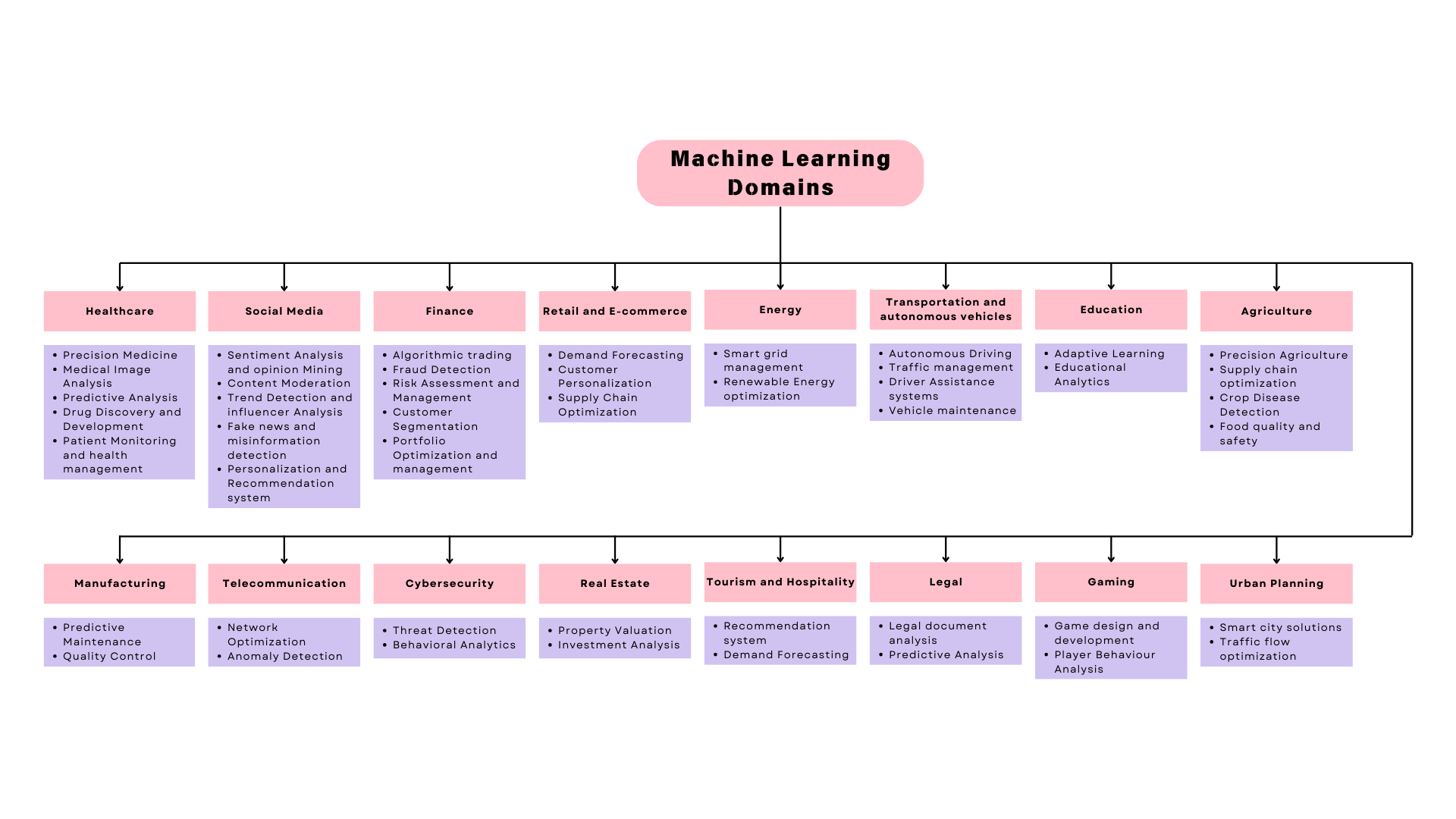Machine Learning Research Domains
 Jyoti Maurya
Jyoti Maurya
As we advance deeper into the 21st century, machine learning continues to transform industries and redefine technological possibilities. The next five years promise even more groundbreaking developments, driven by rapid research and innovation. Understanding the emerging research domains in machine learning is crucial for staying ahead in this dynamic field. In this blog post, we'll explore the most promising research areas poised to shape the future of machine learning, from the evolution of foundation models and multimodal learning to advancements in AI ethics. By delving into these domains, we can better anticipate the next wave of technological advancements and their impact on our world.

By exploring these domains, we aim to provide a comprehensive overview of the key areas to watch in ML research. Understanding these trends will not only help researchers and practitioners stay informed but also inspire new ideas and innovations that can drive the future of machine learning.
Healthcare
Machine learning is revolutionizing healthcare by enhancing diagnostic accuracy, personalizing treatment plans, and streamlining administrative processes. Advanced algorithms can analyze medical images with precision, predict patient outcomes based on historical data, and assist in drug discovery. The integration of ML into electronic health records (EHRs) and wearable devices also facilitates real-time monitoring and early detection of health issues, ultimately leading to improved patient care and outcomes.
Social Media
In the realm of social media, machine learning drives content recommendations, user engagement analysis, and targeted advertising. Algorithms analyze user behavior to curate personalized feeds and suggest relevant content, while sentiment analysis tools gauge public opinion on various topics. ML also plays a crucial role in moderating content, detecting fake news, and identifying harmful activities, thus helping platforms maintain a safer and more engaging user experience.
Finance
Machine learning is transforming the financial sector by enhancing risk management, fraud detection, and investment strategies. Algorithms analyze vast amounts of transaction data to detect unusual patterns and potential fraud in real-time. Predictive models assist in market analysis and investment decision-making, while automated trading systems leverage ML to execute trades with high precision, improving overall efficiency in financial operations.
Retail and E-commerce
In retail and e-commerce, machine learning optimizes inventory management, personalizes shopping experiences, and enhances customer service. Predictive analytics help forecast demand and manage stock levels, while recommendation engines suggest products based on user preferences and purchase history. Chatbots powered by ML provide instant customer support, improving satisfaction and driving sales growth.
Energy
Machine learning is advancing the energy sector by optimizing resource management, predicting equipment failures, and enhancing energy efficiency. Algorithms analyze data from smart grids and sensors to balance supply and demand, detect anomalies in infrastructure, and predict maintenance needs. Additionally, ML models help in forecasting energy consumption patterns and integrating renewable energy sources more effectively.
Transportation
In transportation, machine learning is improving route optimization, traffic management, and autonomous vehicle technology. Algorithms analyze traffic patterns and real-time data to provide optimal routing solutions and reduce congestion. Self-driving cars use ML to interpret sensor data, navigate safely, and adapt to changing road conditions, paving the way for safer and more efficient transportation systems.
Education
Machine learning is reshaping education by personalizing learning experiences and improving administrative efficiency. Adaptive learning platforms use ML to tailor educational content to individual student needs and learning styles, enhancing engagement and performance. Additionally, predictive analytics help educators identify at-risk students and allocate resources more effectively, leading to better educational outcomes.
Agriculture
In agriculture, machine learning enhances crop management, pest detection, and yield prediction. ML algorithms analyze satellite imagery and sensor data to monitor crop health, optimize irrigation, and predict yields. Automated systems powered by ML assist in precision farming practices, leading to increased efficiency and sustainability in agricultural operations.
Manufacturing
Machine learning is driving innovation in manufacturing by optimizing production processes, improving quality control, and reducing downtime. Predictive maintenance algorithms analyze equipment data to foresee potential failures and schedule timely repairs. Additionally, ML-driven automation enhances production efficiency and enables real-time monitoring of quality, ensuring consistent and high-quality output.
Telecommunication
In the telecommunications industry, machine learning enhances network management, customer service, and fraud detection. Algorithms analyze network traffic patterns to optimize performance and predict outages. ML-powered chatbots and virtual assistants provide efficient customer support, while fraud detection systems identify and mitigate suspicious activities, ensuring secure and reliable communication services.
Cybersecurity
Machine learning is crucial in cybersecurity for detecting and responding to threats in real-time. ML algorithms analyze network traffic, user behavior, and system logs to identify anomalies and potential security breaches. By continuously learning from new threats, ML systems enhance the ability to detect sophisticated attacks, protect sensitive data, and maintain robust security measures.
Real Estate
In real estate, machine learning aids in property valuation, market analysis, and customer targeting. Algorithms analyze historical property data, market trends, and location factors to provide accurate valuations and investment insights. ML-driven platforms also personalize property recommendations for buyers and streamline the home-buying process by matching preferences with available listings.
Tourism and Hospitality
Machine learning is transforming tourism and hospitality by personalizing travel experiences and optimizing operations. Algorithms analyze user preferences and historical data to offer tailored travel recommendations and dynamic pricing. Additionally, ML enhances customer service through chatbots and predictive analytics, improving the overall travel experience and operational efficiency for hospitality providers.
Legal
In the legal field, machine learning streamlines document review, legal research, and case prediction. Algorithms analyze vast amounts of legal documents to identify relevant information and assist in case preparation. Predictive models help forecast case outcomes and assess legal risks, enabling more informed decision-making and improving efficiency in legal practices.
Gaming
Machine learning is revolutionizing gaming by enhancing player experiences, optimizing game design, and enabling more sophisticated AI opponents. ML algorithms analyze player behavior to tailor in-game content and difficulty levels, while procedural generation techniques create dynamic and immersive game environments. Additionally, ML-driven AI enhances the challenge and realism of non-player characters, providing a richer gaming experience.
Urban Planning
Machine learning supports urban planning by analyzing data on traffic patterns, population density, and infrastructure usage. Algorithms model and predict urban growth, helping planners design more efficient and sustainable cities. ML also aids in optimizing resource allocation, improving public services, and addressing challenges such as congestion and pollution, leading to smarter and more livable urban environments.
Subscribe to my newsletter
Read articles from Jyoti Maurya directly inside your inbox. Subscribe to the newsletter, and don't miss out.
Written by

Jyoti Maurya
Jyoti Maurya
I create cross platform mobile apps with AI functionalities. Currently a PhD Scholar at Indira Gandhi Delhi Technical University for Women, Delhi. M.Tech in Artificial Intelligence (AI).